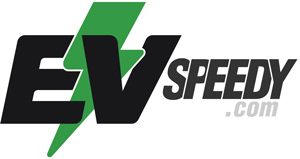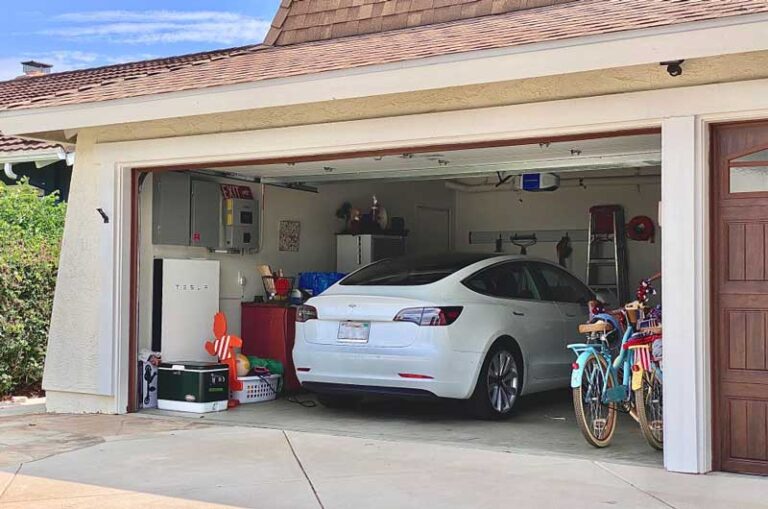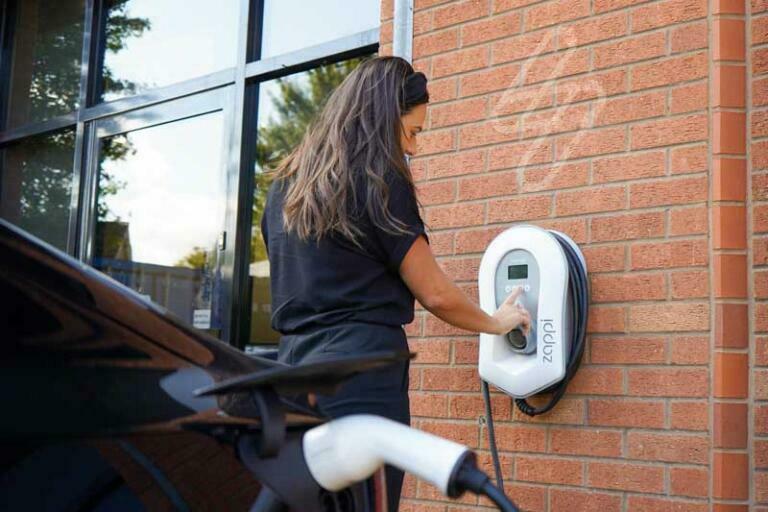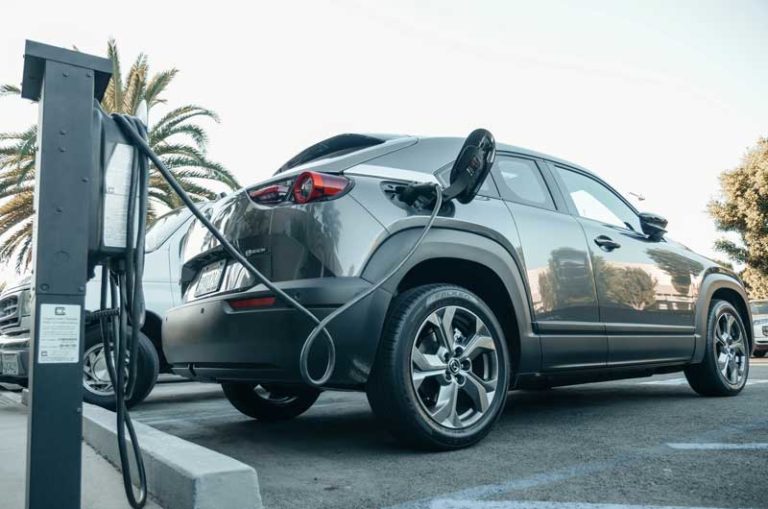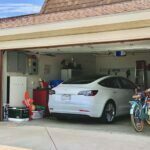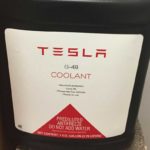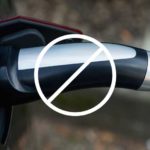While Teslas and other electric vehicles are not only good for the environment and save money on gas, a new question arises for electric car owners: what kind of charger should I use for my car? If you’re researching this question, you’ll come across the Juicebox vs Tesla charger debate. Which is best for you?
The main difference between the Juicebox 40 and the Tesla Wall Charger is that the former is slightly more expensive. However, it’s also more versatile, as it can be used with numerous different electric cars from different motor companies. Teslas, on the other hand, work better with Tesla products.
In this article, we’ll go over the differences between the two chargers, look at the pros and cons of each, and figure out why, depending on your car, the ideal charger may differ from user to user.
The Different Types of EV Chargers: Home Options
When it comes to getting an electric car, there are a lot of factors that go into the decision-making process. If you’re new to the electric car buying and charging process, it can be very confusing.
What is important to know, first, is the differences between level 1 and level 2 chargers:
| Level 1 Chargers | Level 2 Chargers |
| Charging rate of 3 to 5 miles (4.8 to 8 km) per hour | Charging rate of 12 to 80 miles (19 to 129 km) per hour |
| 120 volts needed | Needs between 208 and 240 volts |
| Works great for hybrid cars with small batteries | Works better for cars with larger batteries |
However, in general, if you have a fully electric car, a level 2 charger is best.
Check out this video for more information on which level charger you should choose:
It is also essential to consider the types of different ports that plug into the wall.
For most level 1 chargers, your average three-prong plugin, the same one you would plug your phone in with, will work.
For level 2 chargers, you may need to use a plugin that would be used for a dryer, whether it be old or new, or you may need to hardwire the charger in.
Either way, these chargers are just a little more complex to use.
Similarities Between Juicebox 40 and Tesla Wall Charger
When it comes to these two ports, some things are very similar between the two:
Type of Charger
Both the Juicebox 40 Charger and a Tesla Wall Charger are Level 2 chargers. They both charge quicker than a level 1 charger would, but they also require a little more work when installing into your home.
WiFi Connection
Both have a relatively reliable WiFi network associated with them. Your devices can still be connected to the internet even while charging with both of these chargers. Wi Fi allows you to use Tesla’s or another manufacturer’s app.
App Functionality
You can use an app with both chargers to see where the charge level is with your car during the charging process. You can also use the app to begin or end charging.
Another convenient app feature is that you can schedule your charging to start a specific time and end at a specific time. This can help you to ensure that your EV is charged and ready to go in the morning or whenever you need it.
Installation Cost
They are relatively similar when it comes to the price of installation. However, unless you’re an electrician, chances are you will need to hire a professional. This will ensure the port is compliant with both local regulations and the car chargers’ needs. Installation prices vary between $250 at the low end and $1,900 at the high end, but the average installation price is about $750.
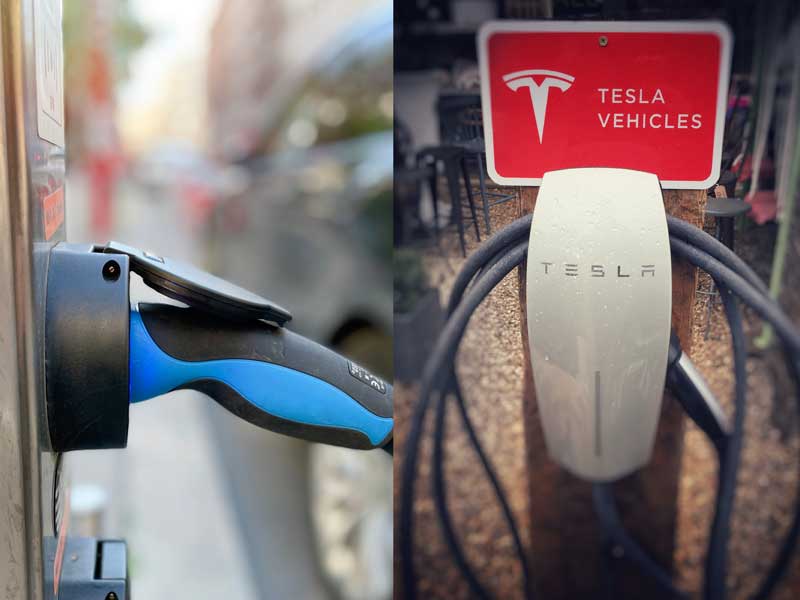
As an added bonus to this article, I’ve created this easy-to-use charging calculator. Simply input your model, charging wattage, and charging percentage, and you will get the estimated time it will take to charge a Tesla in terms of hours. You can play around with numbers a bit just to see how charging time changes:
Differences Between Juicebox 40 and Tesla Wall Charger
While there are some similarities between the Juicebox 40 Charger and the Tesla Wall Charger, there are some key differences too.
The biggest of these differences of the Tesla Wall Connector Vs Juicebox include:
- Charging cables
- What each charger can be used for
- Cost of the charger
- The difference in charging speeds
Below is a quick breakdown of the pros and cons of each charger:
Pros and Cons of Juicebox 40 Charger
| Juicebox 40 Pros | Juicebox 40 Cons |
| Has an easy-to-use interface | Is slightly more expensive |
| Is more adaptable to all kinds of electric cars, regardless of the brand | Does not come with a pedestal mount |
| Is relatively easy to order and get installed | Charges slower than a Tesla Wall Charger |
| Can reliably charge all-electric cars overnight | Has a much longer cable |
Electric cars are quickly becoming the newest and most popular innovation when it comes to the modern-day auto industry.
As listed above, there are definitely some pros and cons to the Juicebox home chargers. Perhaps the biggest benefit is that it a more versatile wall connector for use among electric cars.
While the Tesla Wall Charger is designed for a Tesla, the Juicebox 40 is intended for any electric car use. With an easy user interface and simple design, the Juicebox 40 can be used by almost any electric car owner with relative ease.
A big downside, however, is that the charger itself is more expensive and charges slower. The Juicebox 40 charges at a rate, depending on the car, of about 30 miles (48.3 km) per hour, which is about 14 miles (22.5 km) per hour slower than the Tesla wall charger. It is also more expensive by about $100 to purchase.
Pros and Cons of Tesla Wall Charger
| Tesla Wall Charger Pros | Tesla Wall Charger Cons |
| Charges faster than the Juicebox 40 charger | Less versatile with the cars it can charge |
| Cheaper to purchase than the Juicebox 40 charger | Harder to get than the Juicebox 40 charger |
| Has a pedestal mount making it easier to install in more locations | Is more likely to need to be hardwired |
| Has a smaller charger cord | The user interface is less intuitive |
Ultimately, the biggest issue you will run into with the Tesla Wall Charger is that it is designed for Teslas. This isn’t so much of a problem if you drive a Tesla, making it the best on the market for a Tesla driver.
But if you drive an electric vehicle that isn’t a Tesla, the charger is much harder to adapt to your needs.
And if you live in a home with more than one electric vehicle, and they aren’t all Teslas, the Juicebox 40 would definitely work better for you.
Warranty: Juicebox Vs Tesla Wall Charger
The Juicebox 40 Wall Charger has a three year warranty, while Tesla’s Wall Charger has a two year warranty. This might affect your decision, especially if you don’t own a Tesla electric vehicle.
Tesla Wall Charger Vs Juicebox
When comparing the Tesla Wall Charger and the JuiceBox, several key differences become apparent.
The Tesla Wall Charger is a product manufactured by Tesla Motors specifically designed for charging their electric vehicles. It offers a sleek and compact design, making it easy to install in various locations. With a maximum charging rate of 48 amps, it can provide a fast and efficient charging experience.
On the other hand, the JuiceBox, produced by eMotorWerks, is a versatile charging solution compatible with a wide range of electric vehicles. Overall, the choice between the Tesla Wall Charger and the JuiceBox ultimately depends on the specific needs and preferences of the user.
So, Which Charger Is For Best For You?
Although they can be charged with a JuiceBox Charger, Tesla are best charged with the Tesla wall connector. Tesla’s Wall Charger is perfect for those who drive a Tesla, while the Juicebox 40 will probably be preferable for those who don’t.
Both are high-quality and highly reviewed electric car chargers, but the best charger for your car changes depending on the type of car you intend to drive.
Do I Need A Home Charger For My Tesla?
Whether you need a home charger for your Tesla depends on your daily driving habits and convenience preferences. While it’s not a strict requirement, having a home charger can make your life a lot easier. Without one, you’ll have to rely on public charging stations, which might not always be conveniently located or available. Commercial charging can be an inconvenience when compared to having a Tesla Wall Charger at home.
A home charger lets you juice up your Tesla overnight, ensuring you start each day with a full battery. It’s like having your own refueling station right in your garage.
Plus, charging at home is often faster than at public stations (not than a Tesla Supercharger of course), so you’ll be back on the road quicker. Commercial charging stations are not convenient for people who need to charge their Tesla daily.
So, while you can certainly get by without a home charger having one can definitely simplify your Tesla ownership experience.
How To Install A Tesla Wall Charger
Installing a Tesla Wall Charger at home might sound daunting, but it’s actually pretty doable.
First, you’ll want to pick a spot in your garage or near your parking area that’s easily accessible.
Next, you’ll need an electrician to help you. They’ll set up a dedicated circuit and connect the Wall Charger. Don’t worry, Tesla provides clear installation instructions. Once it’s wired up, hang the charger on the bracket and plug it in.
Now comes the fun part: connecting it to your Tesla. Use the cable provided with the charger and plug it into your car. The charger will handle the rest, and your car will start filling up. Just make sure to secure the cable properly and keep it out of the way.
Remember, safety first! And that’s it — you’re all set to charge your Tesla conveniently at home.
How To Reset Juicebox Pro 40
The JuiceBox Pro 40 is an electric vehicle charging station that can be easily reset if needed.
To reset the JuiceBox Pro 40, follow these steps: First, locate the power switch on the charging station. Next, ensure the charging station is not in use and that there are no vehicles connected to it. Then, press and hold the power switch for approximately 10 seconds until the LED lights on the charging station turn off. After this, release the power switch and wait for a few seconds. Finally, press the power switch once more to turn the charging station back on.
This process effectively resets the JuiceBox Pro 40, allowing it to function properly and provide charging services for electric vehicles.
Who Makes Juicebox EV Chargers?
JuiceBox EV chargers, which are manufactured by a company called eMotorWerks, have gained significant popularity among electric vehicle owners.
eMotorWerks, a leading provider of charging solutions, specializes in creating innovative and efficient charging products for electric cars. The company’s flagship product, the JuiceBox EV charger, has become a trusted and preferred choice for many drivers due to its advanced features and reliability.
With a commitment to sustainability and cutting-edge technology, eMotorWerks has positioned itself as a prominent player in the EV charging market.
Juicebox Vs Chargepoint
In the ongoing competition between Juicebox and Chargepoint, two prominent players in the electric vehicle charging industry, both companies have been striving to establish their dominance in the market.
Juicebox, known for its innovative and user-friendly charging solutions, has gained significant popularity among consumers. With its sleek design, advanced features, and compatibility with various electric vehicle models, Juicebox has successfully carved a niche for itself.
On the other hand, Chargepoint, a well-established company in the industry, boasts a vast network of charging stations, making it a convenient choice for electric vehicle owners. As both companies continue to expand their offerings and improve their technologies, the battle for supremacy between Juicebox and Chargepoint remains an exciting and ever-evolving one.
Check out these 20 great gift ideas for yourself or a Tesla fanboy.
Contact Us if you have any questions or queries.
